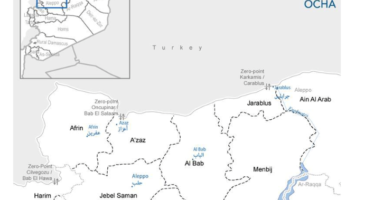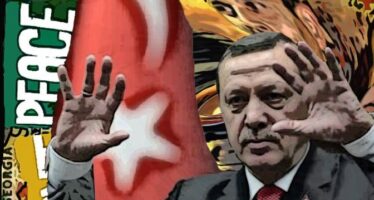Peace, War and the Turkish Media

![]()

There is much talk these days, and rightly so, about the need to challenge and defeat censorship in Turkey. The media are hitting out once again at the government and military for establishing a de facto control over what can and what cannot be published in the media. When censorship and attempt to silence brave journalists are not so open as in the case of Ahmet ??k and Nedim ?ener (to name but two of the journalists put in prison because of their writing) the establishment uses more subtle ways: sudden changes in programming of television channels, for example, with well known and appreciated polemists disappearing from the scene to be replaced with more accomodating anchormen and women.
Journalists in Turkey staged protests and demonstrations. They are paying a high price for doing their work and therefore international community (not just the media family) needs to support the quest for right and freedom of expression and information in Turkey.
Yet reading through the papers these past weeks one cannot ignore the fact that the mainstream media appear to speak out with one single voice when it comes to the country’s biggest and central (in many ways) question. The Kurdish question is – and no matter how much Prime Minister recep Tayyip Erdogan tries to deny this – the most urgent issue in Turkey. It has to be addressed and quickly because things could really turn nastly. And not because of the Kurds, this is to be said loud and clear. The propaganda war is not only that engaged by the government, the state, the deep state, the army. There is another dangerous propaganda war which could have devastating effects. The media these days are playing a great role in informing and influencing the public opinion. Unfortunately – with very few exceptions – they seem to have chosen the war path instead of the dialogue and peace path.
So much for the right struggle against censorship most papers and tv channels are doing a great favour to the warmongers in the Turkish establishment. Could it be because they hope in this way to “buy” mercy in terms of censorship ? As bad as it is to think that, it could well be. But if this is the reason (because it is impossible to accept that in the country’s intellectuals and opinion makers circles nobody or next to nobody is actually interested in talking peace) it would bring no freedom. It would not bring any benefit to the right of the public opinion to an unbiased information. Unbiased, not impartial. Because one can be partial and openly states which side it’s on, but what we are reading in the news these weeks are biased information. And this means cheating the readers. Nothing more nothing less. And cheating the audience for a journalist is the greatest defeat.
Why are most of Turkish media (there are some, few exceptions) cheating their readers ?
Because they are not telling the truth about the war against the Kurds. To put it bluntly: they are simply playing the role of the establishment’s mouth. There is not a single in depth analisys, not a proper investigation. Let’s only go back one month. On 14 of July 13 Turkish soldiers died in Silvan in clashes with the Kurdish guerrillas. “Massacred” screamed most of the headlines. Indeed facts (searched and provided by Kuridsh civil society associations) proved that indeed there was a massacre but the perpetrators were to be sought within the Turkish army itself. Indeed the fire which caused most if not all of the deaths was caused by Turkish bombing. So “frienldy fire” killed the soldiers. But this was ignored. No journalist even felt the urgency to try and go to the combat area, to speak with villagers.
Open the main papers and listen to the main news programmes on tv channels and you will feel they all have the same leit motiv: the terrorists vs the state’s tranquillity. Which terrorists? And this comes the other great lies the Turkish media have deliberately accepted to deliver to their audience. Let’s look at the facts.
The PKK (Kurdistan Workers’ Party) has been on ceasefire for ages in order to favour the creation of suitable conditions for dialogue. Not only were these conditions never sought but war intensify. And not just in the combat zone. A deliberate war (political genocide as some call it without exageration) was started against Kurdish politicians and activists. Thousands are in prison and under trial which has no legal basis as far as international standards go. The Kurdish party (DTP, now BDP) won great results at the elections (both local and general) and was hit by the establishment in the worst possible manner. The PKK, considering that it is an armed organization after all and so simply sit and wait to be exterminated is not an option, resolved to adopt a self defense position. Still refraining from attacking. No change in the attitude by the army and establishment. Indeed more deaths and suffering.
Abdullah Ocalan, the jailed leader of the PKK, is proposing a peace process for years. Indeed his is a very articulated proposal and it deserves not just attention but to be study as a model for others as well, particularly in the turmoiled Middle East. Turkish officials are meeting with Ocalan but again, no serious attempt to even start a process of building mutual trust is made. The media here could have played an important role should they have fulfilled their duty, which is informing the audience. Why could we read virtually nothing about Ocalan’s peace proposal on Turkish media?
The BDP (Peace and Democracy Party) is articulating Ocalan’s proposal while formulating practical and concrete steps that would help a confidence building process needed to enhance any effort for peace. The BDP achievede an extraordinary result in the general elections of 12 June, electing 36 deputies as independent candidates in the Labor, Democracy and Freedom Block. The judiciary came to rescue the government by imposing bans and preventing 6 of these deputies to go to parliament. The media here could indeed have played their role by simply informing their audience that 6 democratically elected representatives of the people would have to remain in prison and so voters will be denied their right to send to parliament those they have elected. No, it did not go like this. Indeed the media help portraying the imprisoned deputies (and those outside boycotting parliament) as enemy of the democratic institutions.
Many other examples could be made. One only needs to look at the latest reporting on the bombing by the Turkish army of the Kurdish mountains (over the border as well) where Kurdish guerrillas are positioned. The army and the government speak war. The Kurds speak peace despite everything. Speaking peace, as Sinn Fein president Gerry Adams says, is far more difficult than making war.
The media have been defeated, once more. They have once more lost their freedom and this time nobody has taken it from them. They have deliberately decided to give it up. They have preferred not to fight for their duty to inform the public. In doing so they have chosen to deal a heavy blow to peace.
Related Articles
AFRIN CIVILIANS “Between a rock and a hard place”
![]()
What is the fate of predominantly Kurdish civilians in the territories occupied by the Turkish state since August 2016?
Graffiti on Amed walls
![]()
I had a burst of emotion: “that’s it”. I had just seen an enormous “Kurdistan” writing in yellow, red and
Rojava – More Unprovoked Turkish Aggression
![]()
“Turkey’s attacks on the Kobani countryside and Tel Ebyid villages is considered as giving ISIS aid to organize it’s ranks…” said Hakki Kobani, for the SDF




